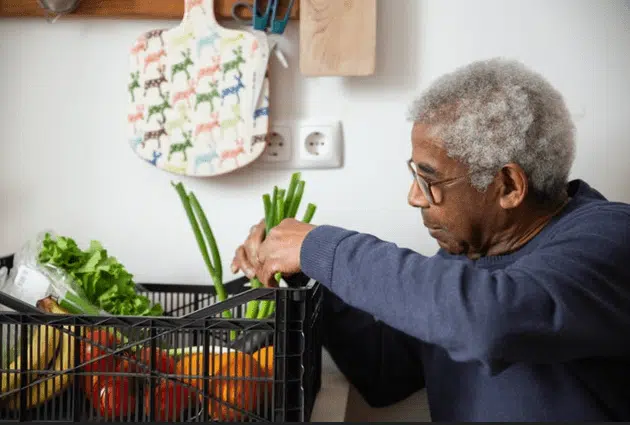Senior Malnutrition: Signs and Prevention
Posted in Senior Malnutrition Signs& Prevention
Malnutrition occurs when a person’s body does not receive the proper nutrients to function.
While malnutrition is a serious health concern at any age, older people are hit particularly hard by the effects of malnutrition, leading to increased fall risks, slower recovery times from wounds and illnesses, and an increased chance of hospitalization. 
The following article outlines warning signs of malnutrition, common causes for senior malnutrition and ways you can ensure your loved one is maintaining a healthy diet.
Signs of malnutrition
Malnutrition can present as a variety of symptoms and can sometimes be misidentified as results of the normal aging process. The most common indicators of malnutrition include:
- Significant weight loss
- Clothes appearing baggier or oversized
- Muscle weakness
- Irregular meal pattern or inability to remember when they last ate
- Lack of energy
- Slow healing bruises, dry, cracked skin
- Frequent illness
- Presence of expired food in the home or lack of food
- Poor memory
Malnutrition causes and risk factors
Malnutrition is commonly caused by not eating enough, or eating foods that lack the correct nutrients to support healthy living. These deficiencies can have physiological causes due to illness or medication, social causes, or behavioral causes. These include:
- Social isolation: Eating meals is a common social activity. Living alone or losing contact with friends and family can cause a loss of interest in eating or cooking.
- Limited income: Limited financial resources due to costs of medical care and medication can make an older adult uncomfortable spending money on food.
- Inability to eat: Difficulty chewing, swallowing, using utensils, or poor dental health can make the act of eating difficult or painful.
- Inability to prepare meals: Limited manual dexterity, fear of household accidents, difficult-to-reach shelves, and fall hazards can make the process of preparing a meal extremely difficult.
- Depression: Depression can have a significant impact on appetite.
- Medication: Some medicines can lower a senior’s appetite or sensitivity to hunger or thirst.
- Loss of taste: Our sense of taste and smell grow weaker over time, and can eliminate the enjoyment of eating meals.
- Dementia and memory loss: Cognitive impairment due to dementia or Alzheimer’s can make it difficult to remember meal time, going grocery shopping, or safely cooking.
How your doctor can help
If you are concerned that you or a loved one is experiencing malnutrition for any reason, speaking to your doctor is a good first step towards getting your nutrition back on track. Solutions to malnutrition vary depending on the root cause of the problem, but may include:
- Working with a dietician to determine the proper amount of calories and nutrition needed daily.
- Reviewing medication and looking for alternate prescriptions that can avoid impacting appetite.
- Treating underlying illnesses contributing to malnutrition.
- Using behavioral specialists to address psychological causes for malnutrition.
How family members can help
Watching a loved one experience malnutrition is difficult, but knowing how to help can be hard too. If you are concerned that a loved one is experiencing malnutrition, consider speaking to your loved one and their doctor about what you can do. Some solutions include:
- Assisting in grocery shopping and/or meal preparation.
- Reconfiguring your loved one’s kitchen to make meal preparation easier.
- Replacing utensils and kitchen appliances with models designed for use by people with limited manual dexterity.
- Setting up food and grocery delivery services.
- Reaching out to support networks like Meals on Wheels.
- Hiring an in-home caregiver to support your loved one.
Malnutrition is a common challenge for older adults, but it can be overcome with early detection, planning and ongoing support.
When an older adult begins to show signs of malnutrition, many families make the decision to bring home health caregivers into their loved one’s home. A home health caregiver can assist with grocery shopping, meal planning, cooking, and assist clients who have difficulty eating alone. Home caregivers also provide valuable companionship to make meals happier events and can provide ongoing supervision, ensuring an older adults family and doctors are rapidly notified in the event of any changes in eating habits.
If you are concerned about a loved one’s nutritional health, or if you wish you had another helping hand in your life, consider calling SelectCare today or learning more by requesting a free in-home care guide. Our team of home health care experts have helped New Yorkers live happier, healthier lives in their long-time homes for more than 37 years.
